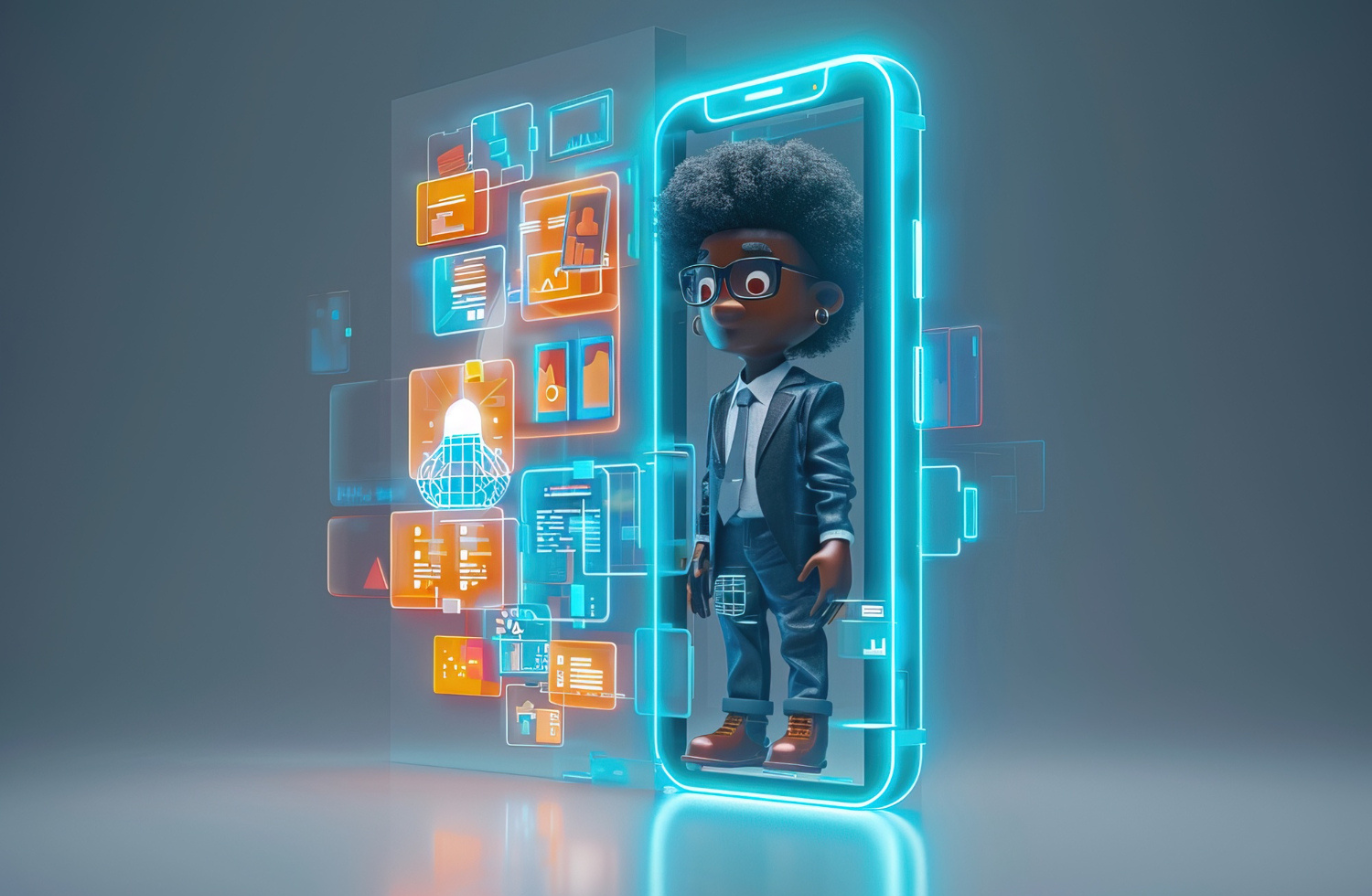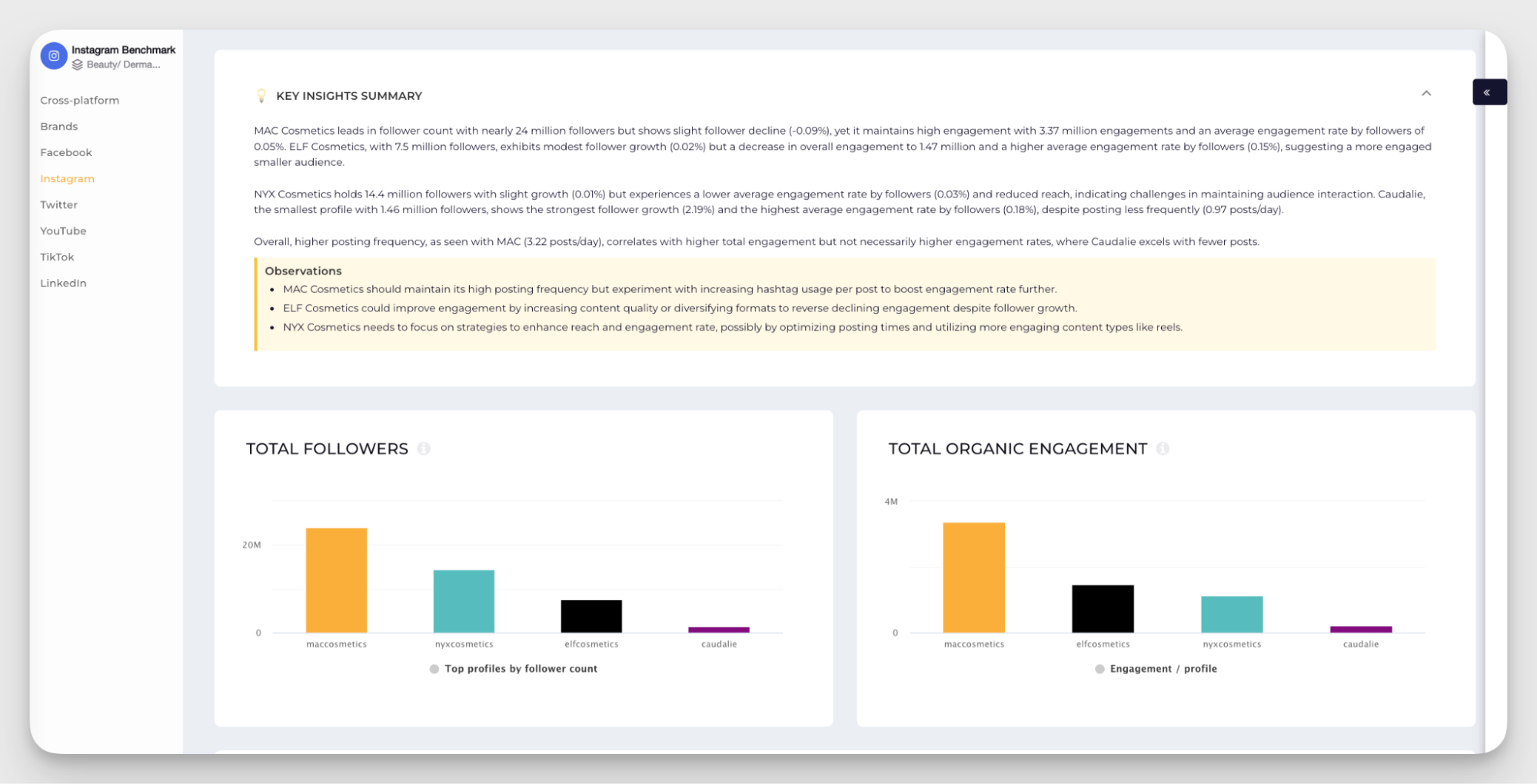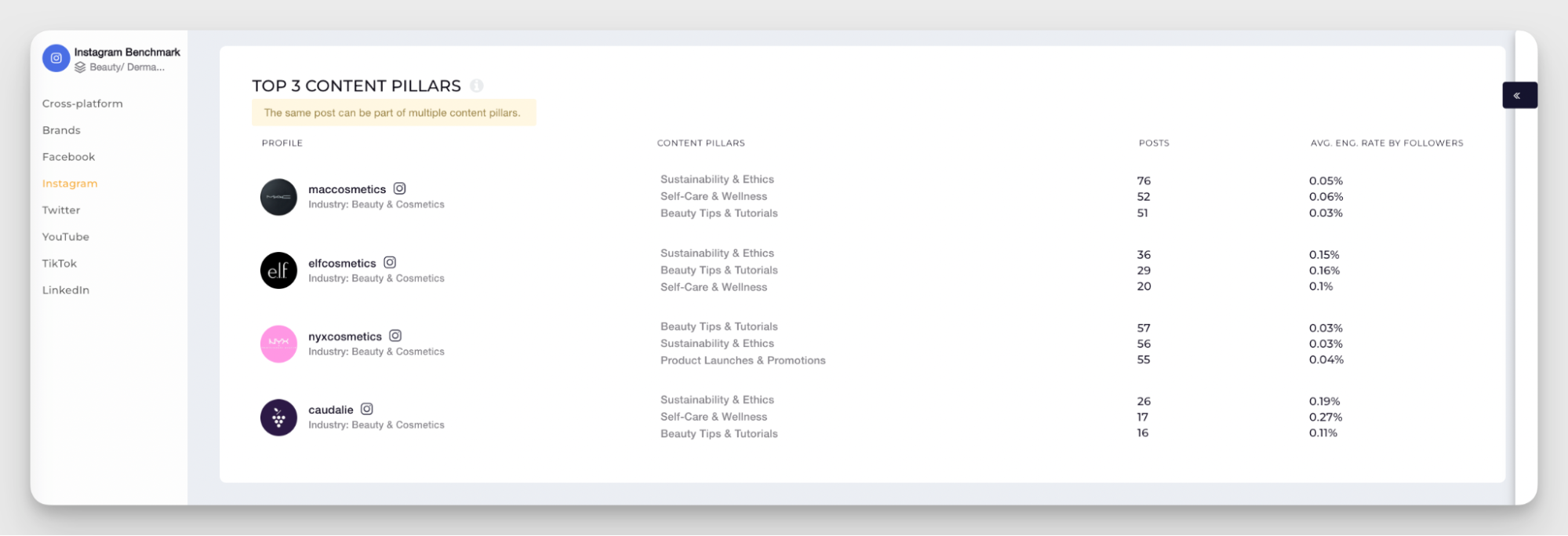How to Use an AI Social Media Agent to Unlock Success On Social Media
Unlock the potential of your social channels with an AI social media agent that can deliver your smart automation for superior performance.


Endless tasks, complex metrics, and the pressure to stay ahead of trends?
I get it. You’re expected to deliver results. But without the right systems, it’s easy to feel stuck.
That’s where the AI social media agent comes in to sharpen your strategy with clear, actionable insights.
AI in social media is the game-changer. It lets you work smarter and gives you the freedom to focus on what really matters: building your brand, engaging your audience, and driving success.
Let’s dive in.
Key takeways
-
What is an AI social media agent? An AI social media agent is an all-in-one tool that automates content creation, analytics, and engagement to streamline your social media management.
-
Why are the benefits of using AI agents to scale social media? The benefits of using AI agents to scale social media include saving time, accelerating content testing, improving performance through real-time insights, and freeing humans to focus on strategy and creativity.
-
What AI social media agents can (and can't) do? AI social media agents can efficiently create and adapt content, automate engagement, and analyze audiences and trends, but they can’t replicate human creativity, cultural awareness, strategic thinking, or relationship-building.
-
How to implement an AI social media agent without losing brand voice?
You can implement an AI social media agent without losing brand voice by setting clear guardrails, adding human checkpoints, and training the AI with your best-performing, on-brand content. -
What are some AI use case examples? AI agents and competitive intelligence work together to reveal competitor strategies, uncover performance gaps, and highlight content opportunities your brand can leverage for growth.
What is an AI social media agent?
An AI agent is an advanced AI tool designed to simplify and enhance your social media management.
As the name suggests, it leverages artificial intelligence to automate tasks like generating social media posts, tracking analytics, and managing responses.
This all-in-one solution helps marketers save time and improve their social media strategy.
Why are brands using AI agents to scale social media?
AI agents are becoming a cornerstone for brands looking to streamline their social media efforts, and for good reason.
These tools not only save time but also help brands scale their presence, improve engagement, and fine-tune their strategies.
But when does it truly make sense to use, and when should brands hold back?
Time savings vs. content performance metrics
If you ask me, I'd say one of the biggest advantages of using AI agents is the ability to significantly reduce the time spent on routine tasks.
From social media market research to content creation and scheduling, AI can automate much of the groundwork.
This frees up your team to focus on high-level strategy, creative brainstorming, and relationship building, things that truly require a human touch.
But here’s the kicker: the time saved isn’t just a luxury, it’s an opportunity.
With AI handling the heavy lifting, brands can quickly test more content variations, monitor performance metrics in real-time, and adjust their approach accordingly.
This means more data, more insights, and ultimately, better-performing posts.
When social media AI agents make sense (and when they don't)?
Honestly, AI agents are a great fit when your brand has already laid a solid foundation in terms of voice, content strategy, and audience understanding.
These tools are built to amplify what’s already in place, automating the execution of your ideas and scaling your content output.
However, AI isn’t a magic solution for every situation.
They’re less effective if your brand is still figuring out its identity or trying to navigate new platforms or strategies.
In such cases, human expertise and intuition are critical to developing the initial framework and understanding what resonates with your audience.
AI agents excel at improving the speed and volume of execution, but they can’t replace the creativity, cultural awareness, or nuanced decision-making that humans bring to the table.
This brings me to my next point.
What AI social media agents can (and can't) do
While it brings some serious firepower, AI isn’t perfect, trust me.
Thus, it’s important that social media strategists understand both what it’s great at and where it might fall short, so they can make the best use of it.
Strengths of social media AI agents
Let’s dive into the things these AI agents do really well, because they’ve got some solid skills up their sleeves:
Content creation and adaptation across platforms
From experience, I can say that AI for social media content creation is a game-changer when it comes to efficiency.
It can quickly generate social media posts across multiple platforms, saving you time and effort.
Whether you’re repurposing a blog post for Instagram stories, crafting a tweet from a blog excerpt, or adapting a video for various formats, AI agents act like a turbocharged content machine.
They can generate tailored posts and captions that align with your social media content strategy, and even suggest edits based on platform best practices.
Response management and engagement automation
One of AI's standout strengths is in social media interactions management.
Social media moves at lightning speed: comments flood in, DMs pile up, and keeping up with it all can quickly become overwhelming.
This is where AI for social media management truly shines.
It handles responses, tags relevant interactions, and directs messages to the right team members for a personalized touch.
With the right setup, AI can manage the bulk of your engagement, giving you more time to focus on building and nurturing the relationships that matter most.
Audience analysis and trend identification
AI agents are data-driven wizards.
They can analyze your social media consumer behavior, perform a social media trend analysis, and give you insights that might take a human hours (or days) to uncover.
This way, you can craft the perfect content at the perfect time.
When I sat down with Lindsay Rosenthal, founder of Creed. Marketing for a quick chat on how AI shapes social media nowadays, and asked her when social media AI agents make sense, and when they do not, she said:
They make sense when a person already has a strong perspective, social media “muscles,” and enough raw material to work from. Then the agent can help scale tailored and relevant output, research ideas, and repurpose ideas, all without losing identity.
They do not make sense when the person has not developed their voice yet nor know the ropes of social media platforms and algos. There is nothing to scale in that case. Humans must first establish their own strategies and goals, then allow AI to assist in these. Humans in the loop, always!
Limitations of AI agents for social media marketing management
As powerful as AI agents are, there are still areas where they can’t quite replace the human touch.
Let me give you some specific cases where these bots might need a little help from their human counterparts:
Cultural sensitivity and context awareness
AI might be able to understand basic language rules, but when it comes to nuance, especially across different cultures, AI can miss the mark.
Understanding local slang, humor, and subtle cultural cues is something that still requires a human perspective.
Long-term strategic planning
While AI can handle the day-to-day execution of your strategy, it can’t map out your long-term vision.
Strategy requires foresight, adaptability, and the ability to make judgment calls based on intuition, things AI still struggles with.
In short, AI doesn’t create vision. It supports it.
Relationship and partnership judgment
Building relationships, especially with influencers, partners, and clients, requires emotional intelligence and personal touch.
AI can’t pick up on the subtle cues or personal dynamics that make a great partnership.
For that, you need a human who can read the room, make personal connections, and build trust over time.
How to implement an AI social media agent without losing brand voice
So you're ready to bring an AI social media agent into the mix, but you’re worried about losing your brand’s voice.
I totally understand you!
AI can boost your social media game, but it’s crucial to make sure it doesn’t water down what makes your brand you.
Here are my recommendations on how to use AI without losing that personal touch:
Create effective AI guardrails and brand guidelines
First thing’s first: set clear guidelines.
You wouldn’t let someone speak on your brand’s behalf without knowing the tone, the style, and the rules, right?
Same goes for your AI and social media marketing.
Make sure it’s trained on your brand’s voice—how you talk to your audience, your visuals, even the types of jokes or references you use. This way, AI can generate content that feels on-brand and doesn’t sound like it was written by a robot (even though it technically was).
Establish an approval workflow: don’t forget to add human checkpoints
AI-powered content creation is great, but it’s not foolproof.
That's why I would strongly advise you to set up an approval process to review what the AI creates before it goes live.
Think of it as a safety net: AI handles the legwork, and humans make sure the content fits perfectly. It’s like having an assistant who’s great at the details but still needs your expert eye to make sure everything feels right.
Training your AI agent for social media with your best-performing content
Want your AI to really nail it?
Feed it your best content.
Give it examples of posts, captions, and campaigns that have worked well in the past.
The more you train your AI on what’s already resonated with your audience, the better it’ll be at creating content that feels authentic and aligned with your brand.
AI use case example: AI agents and competitive intelligence
AI isn’t just good at content creation or social media management.
It’s also incredibly good at showing you what’s working (or not) in your competitors’ world.
When you plug competitive intelligence into your AI social media agent, you get a clearer picture of the strategies other brands rely on, the formats they prioritize, and where the opportunities lie for you.
Use AI for social media to analyze competitor content strategies
One of the things that I like most about AI is that it makes it easy to analyze your competitors’ content strategies and uncover what’s driving their engagement.
By using social media analytics tools with AI features, such as Socialinsider, for competitive benchmarking, you can quickly identify the content pillars that each competitor is focusing on and how those pillars impact their performance.
Take NYX Cosmetics and MAC for example.

For NYX, the data from Socialinsider reveals a slightly lower engagement rate, and it’s clear that they’re not leveraging Reels as effectively as their competitors.
In contrast, MAC Cosmetics posts more frequently (3.22 posts/day) and uses Reels to drive higher engagement, a strategy that could also benefit NYX.
This kind of competitive insights helps you identify where your competitors are excelling and where there are opportunities for your brand to step up its game.
It’s a data-driven approach to understanding the competitive landscape and finding areas for growth.
Identify gaps in competitor coverage
From what I've seen, I'd say one of the biggest social media marketing challenges brands face is not just knowing what their competitors are doing, but understanding what they’re missing.
And that’s where the real opportunities lie.
Through social media competitor analysis, AI helps you quickly spot gaps in competitor strategies, allowing you to pivot faster and more effectively.
Let me walk your though another analysis example applied to NYX Cosmetics.

Their engagement rate lags behind that of competitors like MAC Cosmetics, and a deeper social media content analysis reveals a clear missed opportunity: Self-Care & Wellness.
This content pillar, actively used by brands like Caudalie and ELF Cosmetics, is gaining traction in the beauty and wellness industry, and by overlooking it, NYX may be missing out on a growing trend.
So, what's the takeaway here?
AI uncovers these gaps efficiently, giving your brand the chance to capitalize on areas where competitors are underperforming or neglecting to focus. This empowers you to create more targeted and strategic content that speaks to your audience’s current interests and needs.
Common mistakes when scaling social media with AI agents
I've seen this several times. Without the right approach, AI can quickly become a shortcut to mediocrity rather than a tool for growth.
Let me quickly run you through the pitfalls I've experienced myself, that could be slowing you down and how to fix them before they do damage:
Failing to update AI training as your brand evolves
One thing that I've learning through my AI adoption process is that, as your brand grows and the social media landscape shifts, it’s crucial to keep your AI in sync.
Failing to update your AI’s training means it’s working with outdated data, which can result in irrelevant or mismatched content.
Social media trends, audience behaviors, and platform algorithms evolve quickly, so regular updates are key to ensuring your AI stays sharp and aligned with your current brand voice.
Measuring success only by cost/time savings
Yes, AI can save you time and money, but those aren’t the only metrics that matter.
Focusing solely on efficiency can blind you to other critical factors like engagement, brand awareness, and content quality.
To truly understand AI's impact, consider how well it’s driving your social media data collection, fostering deeper engagement, and contributing to long-term brand growth.
Here's my insight about that: a holistic approach to measuring success will give you a clearer picture of AI’s role in your strategy.
Forgetting that the landscape changes, and not adapting fast enough
You know the drill.
The social media landscape is constantly changing, and what worked last year may not work today.
Brands often make the mistake of not adapting fast enough to these shifts.
Whether it's new platform features, changing user behavior, or emerging trends, AI should be agile enough to adjust.
By integrating real-time data and continuously monitoring the market, you ensure your AI evolves with the landscape, keeping your content relevant and on point.
And lastly, here's what Lindsay also considers a huge mistake when scaling social media with AI agents:
Trying to automate before the message is clear. Allowing the agent to publish without review. Producing quantity instead of quality. And avoiding actual customer conversations. AI can support the work, but it cannot replace the thinking.
Final thoughts
Now that you’ve learned how to use AI in social media analysis, the real magic lies in how you actually use it.
For me, AI isn’t just about crunching numbers or saving time. It’s about gaining deeper insights and staying agile in a world that never stops shifting.
When done right, AI helps you actually stay ahead of the curve.
It allows you to focus on what truly works for your audience and outsmart your competition.
So, if you’re willing to put in the work to adapt, AI will absolutely be one of the smartest investments you can make for your social media strategy.
Analyze your competitors in seconds
Track & analyze your competitors and get top social media metrics and more!
You might also like
Improve your social media strategy with Socialinsider!
Use in-depth data to measure your social accounts’ performance, analyze competitors, and gain insights to improve your strategy.
